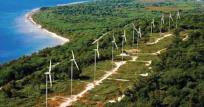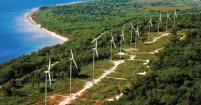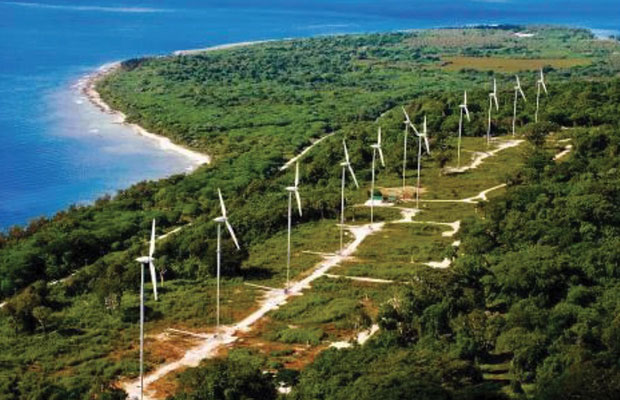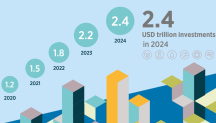

World Leaders Back Major Renewable Energy Initiatives for Africa and Islands at UN Climate Summit
Newsletter
IRENA initiatives would boost power supply and cut CO2 emissions
New York, United States of America, 23 September 2014 – Two initiatives to expand people's energy access through clean, renewable energy will be substantially scaled up in Africa and small island developing states (SIDS), it was announced today at the Climate Summit by a coalition of leaders from government, business and civil society.
The initiatives, the Africa Clean Energy Corridor and the SIDS Lighthouse Initiative, both of which are facilitated by the International Renewable Energy Agency (IRENA), will strengthen international cooperation and speed the development of low-carbon renewable energy resources.
Expanding the use of renewable energy is one of the major themes of the United Nations Secretary-General’s Climate Summit, which aims to mobilise resources and generate actions that will reduce emissions and build resilience to climate change.
Expanding energy supply in Africa, reducing costs
The Africa Clean Energy Corridor (ACEC), a regional initiative to advance the development of renewable energy projects from Cairo to Cape Town, would cut annual carbon dioxide (CO2) emissions level in 2030 by 310 metric tonnes throughout the Eastern Africa and Southern African power pools. The initiative took a major step forward today as 32 partners – including the governments of 19 countries, along with regional organisations, development partners and financial institutions – rallied behind the implementation of an Action Agenda endorsed in Abu Dhabi earlier this year.
Cooperation on regional renewable energy deployment would reduce generation costs by four percent and nearly triple electricity supply, thus transforming the current energy mix of a large portion of the African continent.

A. Islands can achieve self-sufficiency through clean, indigenous renewable energy (Cabo Verde)
“Africa’s surging economic growth can be fuelled by an energy mix that emphasises the development of its vast renewable energy resources,” said Mrs. Nkosazana Clarice Dlamini-Zuma, chairperson of the African Union. “Low-carbon economic development powered by renewable energy can help meet the challenge that climate change presents, all the while improving the livelihoods and economic well-being of people all over Africa.
Four-fifths of all electricity in eastern and southern Africa is currently generated from carbon-bearing fossil fuels like gas, oil or coal. And regional demand for electricity is expected to at least double in the next quarter century. The ACEC aims for half electricity to be produced from clean, indigenous, cost-effective renewable power options by 2030, allowing savings of 2,500 metric tonnes of cumulative CO2 emissions between 2010 and 2030. The combined effort will also diversify resource availability, improve energy security and foster investment opportunities and job growth.
The ACEC Action Agenda identifies development zones where power-generation facilities can be clustered in areas with high renewable resource potential, as well as practical access to transmission lines to major demand centres. Integrated resource planning will include greater shares of renewable energy in the energy mix, complemented by new financing models and investment frameworks; knowledge and capacity building; and public information campaigns.

B. Renewable energy technologies can power future African economic growth without contributing to climate change
ACEC partners include Angola, Botswana, Burundi, the Democratic Republic of Congo, Djibouti, Egypt, Ethiopia, Kenya, Lesotho, Malawi, Mozambique, Namibia, South Africa, Sudan, Swaziland, Uganda, the United Republic of Tanzania, Zambia, and Zimbabwe. Also supporting the initiative are France, Italy, New Zealand, the United Arab Emirates and the United States of America, along with the African Union Commission, the East African Community, the New Partnership for Africa’s Development, the African Development Bank, the United Nations Development Programme, the United Nations Economic Commission for Africa, Copperbelt Energy Cooperation and ENEL Green Power.
Empowering islands with clean, indigenous renewable energy
Also announced at the Summit were pledges to accelerate renewable energy through the SIDS Lighthouse initiative, a framework for action to support islands in transforming their energy systems with greater shares of renewable energy.
Through partnerships and focused cooperation, the initiative aims to mobilise US$500 million within five years and deploy 100 megawatts (MW) of new solar photovoltaic capacity, 20 MW of new wind power, significant quantities of small hydropower and geothermal energy, and various marine energy technologies.
In total, the initiative aims to deliver a cleaner energy mix for up to 4.7 million people living on the front line of climate change on small islands around the world. Disconnected from mainland electricity grids, islands are especially vulnerable to fluctuations in the supply and cost of imported fossil fuels.
“For island states, climate action is a matter of survival,” said Samoa Prime Minister Tuilaepa Aiono Sailele Malielegaoi “By marshalling resources and providing a platform for knowledge sharing, the Lighthouse Initiative will speed the uptake of renewable energy on islands around the world, underscoring that SIDS are leading on climate change by example.”
Partners in the SIDS Lighthouse Initiative include Antigua and Barbuda, Bahamas, Barbados, Cabo Verde, the Cook Islands, the European Union, Fiji, France, Germany, Grenada, Guyana, the Indian Ocean Commission, the International Renewable Energy Agency, Japan, Kiribati, the Maldives, Mauritius, Nauru, Niue, New Zealand, Norway, the Republic of the Marshall Islands, Palau, Sao Tome and Principe, Samoa, Sustainable Energy for All (SE4ALL), the Seychelles, St. Vincent and the Grenadines, Tonga, Trinidad and Tobago, Tuvalu, the United Arab Emirates, the United States of America, the United Nations Development Programme, Vanuatu, and the World Bank.
IRENA spearheads global effort on renewables
The renewable energy effort at the Climate Summit is being spearheaded by IRENA, the intergovernmental organisation working to promote renewables worldwide.
“These two important initiatives can dramatically reduce dependency on fossil fuels for electricity generation in Africa and island nations, reduce carbon emissions and set the stage for low-carbon economic growth,” said IRENA Director-General Adnan Z. Amin.
“Renewable energy should not be seen as a niche for wealthy countries. The rapid deployment of renewable power generation technologies and the corresponding decline in costs increasingly mean that renewables can provide an affordable pathway for developing economies to leapfrog the dominant energy paradigm and move towards a sustainable energy future,” Mr Amin added.
The one-day UN Climate Summit focuses on concrete partnerships and initiatives to help move the world toward a path that will keep global warming within two degrees Celsius compared to pre-industrial averages, the widely cited tipping point at which the worst impacts of climate change become unavoidable.




